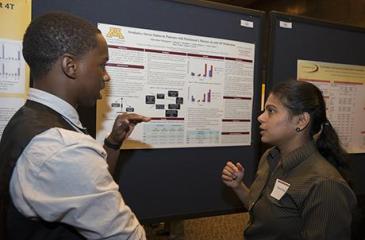The University of Minnesota is known for its brilliant researchers who make groundbreaking research discoveries all the time. But last night, the Clinical and Translational Science Institute (CTSI) celebrated a specific, very remarkable subset of researchers - those committed to bringing their discoveries into practice.
Showcasing translational research
Nearly 70 researchers showcased how they're moving their discoveries along the translational path and into real-world practice. Researchers ranged from an assistant professor of medicine who is formulating a potential therapy for the treatment of head and neck cancer to a PhD student creating mobile-based interventions for obesity control and prevention.
"These researchers aren't content with simply publishing their findings and moving on to the next thing," noted CTSI Director Bruce Blazar, during a speech celebrating translational researchers. "Rather, they're bringing their discoveries into practice and doing their part to improve health."
Judges evaluated the posters, awarding 12 researchers with travel awards to present their research at national conferences.
Recognizing strong mentors
Last night CTSI also named Carol Lange, PhD, as the 2013 Mentor of the Year, an award driven by the compassion of the mentees who nominate their research mentors. Dr. Lange serves as a professor of Medicine and Pharmacology at the University of Minnesota Masonic Cancer Center. She is also a director of the Masonic Cancer Center's Cell Signaling and Cancer Biology Training Program.
Dr. Lange received $2,500 for this honor. Letters nominating Dr. Lange's were full of praise and admiration for her commitment to mentorship, her dedication to knowing students on an individual level, her professional integrity and the success of her scientific career.
One letter read, "Dr. Lange has an amazing generosity of spirit. Her engaging energy and tremendous capacity for intellectual creativity has created a stimulating and productive scientific environment that I am excited to work in every day."
From the mentor award to the teams of translational researchers, collaboration was one of the evening's recurring themes. Dr. Blazar conveyed this as well, telling the crowd of students, faculty, staff and community members, "By working together, we can improve human health."
